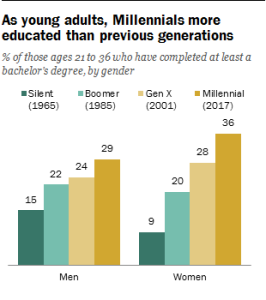Over the years, generations have grown and evolved in the way that societies have changed. Generations have proved that they adapt with the environment around them. As we move more and more into technology, the millennial generation has worked it into their day to day lives as well.
“It’s a cultural difference between the generations and obviously you’re going to reflect your culture that you grew up in and the students from fifty years ago are going to reflect that culture of that time,” Dr. McKinley, the chairman of the sociology department at Cabrini University said
Technology has always been a part of the millennial’s lives, unlike the baby boomer generation. This generation has relied solely on electronics and other generations believe that we have lost some sort of communication.
Along with communication comes education; older generations also believe that millennial’s have relied on technology to a point where we are not using important aspects such as critical thinking.
“I think students don’t really read books anymore and they try to figure out how to get through a course without ever reading… and I think that it is the norm now,” Dr. McKinley said. “I think if I have to compare generations, that has gradually become normal instead of deviant… I remember even in my son’s generation there was a move to that.”

Dr. McKinley has also pointed out the ease that Google has created with navigating through schoolwork.
According to the New York Times, “Today, more than half the nation’s primary- and secondary-school students — more than 30 million children — use Google education apps like Gmail and Docs.”
However, even though this generation could be frowned upon with the idea that students rely on technology to get through school, there has been an increase in going to school.
“My grandparents did not go to college,” Professor Mark Gross, a sociology professor at Cabrini University, said. “I think back when they were coming of age, it was not at all assumed that people were going to college.”
According to PewResearch.org, “Among Silent Generation (1966) women, only 9 percent had completed at least four years of college when they were young. By comparison, millennial women (2017) are four times (36 percent) as likely as their Silent predecessors were to have at least a bachelor’s degree at the same age.”

Many older generations could argue and say that the technology has even took away some skills, but others would say that it has evolved along with the technology.
“I would potentially push back on the idea that young people are not developing communication skills, it’s just a different set of skills,” Professor Mark Gross said. “We might view if you look to your phone at a social event do not have the skill set or ability or desire to interact with people around them but most people are interacting with other people on their phone.”
“We’re all different because we are trying to figure out the world and how to live in it,” McKinley said.



where is the rest of this article??……..on google?..